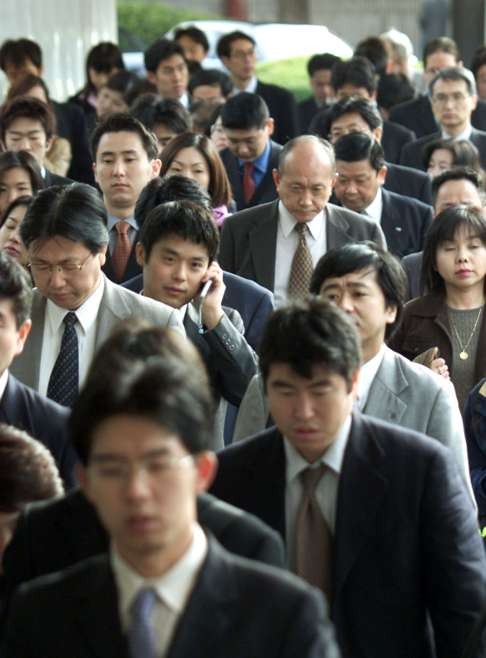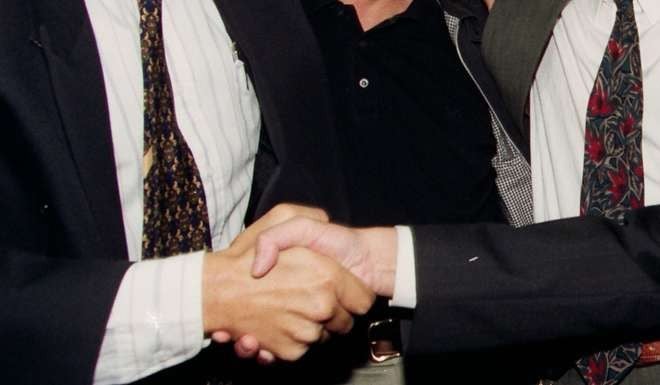The trio of ‘insiders’ who relieved some of Hong Kong’s top bankers of US$32.5m, then disappeared
Accountants are still trying to work out exactly how the cash-advances scheme devised by Stone, Grainger and Zoen managed to dupe so many ‘friends’

Inside Hong Kong’s upmarket American Club, few worked a room quite like Avery Stone.
Over steak dinners and cigars, Stone charmed a Who’s Who of financiers into investing millions in his fledgling business. Then, earlier this year, everything unravelled, and he vanished.
Left behind are the questions, including the big one: How did Stone and his partners at Global Merchant Funding Ltd (GMF) apparently dupe Hong Kong’s princes of finance into believing their business was on solid-footing? Accountants are still trying to piece together the answers.
“This isn’t a deal that went bad, these guys systematically preyed off their friends,” said Thomas Gallagher, one of GMF’s investors, who had set up Citigroup Inc’s fixed-income prime brokerage in Asia and now works for a hedge fund services firm.
“The fact of the matter is, these guys essentially were in our circle.”
For many, the money in question – $32.5 million, a pittance by Wall Street standards – is far less astounding than whose money it is.
Documents related to the liquidation of Stone’s company show that many of its investors were drawn from prominent international banks. For them, weighing financial risks is crucial to their day-to-day jobs. In this case, they didn’t see the danger until it was too late.
Among those on a list of more than 80 creditors seen by Bloomberg News are: Morgan Stanley’s co-chief executive officer for Asia excluding Japan, Gokul Laroia; Martin Wong, now chief integrity officer at a US software startup for online lenders and previously chief administrative officer and general counsel for the Asia-Pacific region at Citigroup; and Peter Tattersall, chief operating officer for fixed-income sales in Asia with Morgan Stanley, a role that involves responsibility for auditing and for implementing regulations.

All of them directly or through a spokesman declined to comment.
Hong Kong police began investigating GMF after the company’s liquidator, accounting firm JLA Asia, reported in April that it suspected the three directors – Stone, Richard Grainger and Simon Zoen – may have misappropriated some of the money owed to the investors. None of the three replied to telephone calls, registered letters or e-mails.
Stone’s 82-year-old father, Richard, said his son came home, to the wealthy New York suburb of Pound Ridge, earlier this year after he loaned him $89,000 “to get out of Hong Kong very fast.”
Yet Avery then stole $400,000 worth of family belongings, including his father’s Smith & Wesson pistol, a Lalique bowl and collection of watches, he said. Police confirmed they were investigating the alleged theft.
He’s a crook, ok? You can quote me on that. He’s lying low, because he’s a low-life
“He’s a crook, ok? You can quote me on that,” said Richard Stone. “He’s lying low, because he’s a low-life.”
What exactly were Stone and his partners up to? From its offices in Hong Kong’s famed red-light district of Wan Chai – where GMF had outfitted an entire floor including a pool table and a stocked minibar, according to three people familiar with the space – the company’s strategy relied on extending cash advances to local businesses in exchange for a cut of future credit card receipts.
Stone, Zoen and Grainger had established their company in 2008, citing more than “60 years of experience between them in the global banking and financial services industry,” a cached view of GMF’s website says.
Stone had previously worked at Mastercard Inc and American Express Co, Zoen cited experience in the card business at Citigroup. And Grainger had worked at Barclays.
Done right, the cash-advance business – new to Asia but well-established in the US and Europe – can generate double-digit returns with seemingly little risk, three GMF investors said.
The prospect of those returns reeled in investors. The company soon expanded to Singapore and Taiwan.
Stone exuded bonhomie, people who know him said. Grainger, a winger on the Hong Kong Police rugby team, expanded his network of investors via a three-year stint on a British Chamber of Commerce program for angel investors.
GMF, too, projected an air of easy success, even though it struggled to turn a profit. Stone was such a fixture at the American Club that many people thought he was on its board. He wasn’t, according to the club.
John LeFevre, a former Citigroup banker known by his Twitter handle, @GSElevator, and author of the Wall Street memoir “Straight to Hell,” said he invested in GMF early and got out with all his money in 2013.

“You get on the bus and it’s all rich, smart guys, and we all think someone is driving, but everyone’s just taking a nap in the back,” said LeFevre, who cited frequent name-dropping of big investors as a means of bringing in new money.
But GMF, which employed about 30 people, was essentially insolvent for its final two years of operations, according to its liquidator, JLA Asia (JLA), now combing through 7,000 transactions in the case.
“We are still piecing together what happened,” said Nisha George, a JLA manager.
According to a report JLA sent to investors, GMF posted a net loss every year from 2010 to 2014 – with the deficit ballooning to HK$123 million ($15.8 million).
A slew of lawsuits filed in 2012 and 2013 show GMF chasing up small merchants for cash-advance repayments ranging from HK$30,000 to more than HK$1 million. Zoen, the company’s dealmaker, at some point suffered a heart attack and left Hong Kong, JLA said.
Representatives from one of Hong Kong’s organised crime syndicates, known as triads, showed up at GMF’s offices to deliver a warning about encroaching on their money-lending turf, according to LeFevre who said he was told about it by the directors at the time.
A GMF subsidiary failed to segregate money that should have been kept in a trust account on behalf of investors, according to JLA, and instead the money was used to pay rent, salaries and other expenses.
Even as GMF’s troubles deepened, its founders sought to maximise their existing fund base and even expand it. It was, liquidators have since concluded, an attempt to play for time.
“They should have put up the white flag a lot earlier,” said John Lees, executive chairman of JLA. “They have never really made money.”